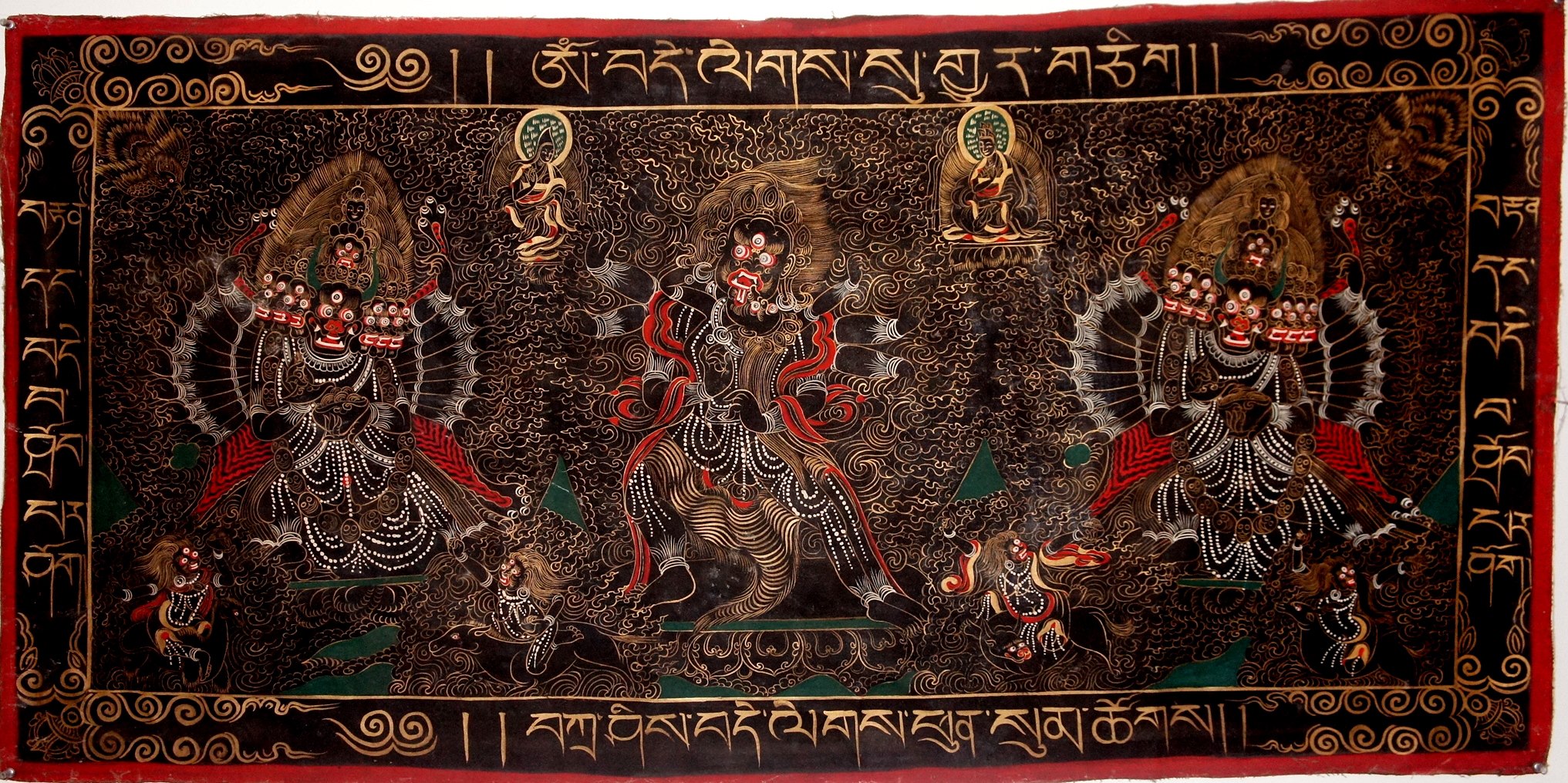-
Content count
2,094 -
Joined
-
Last visited
-
Days Won
7
Everything posted by 9th
-
-
Id say thats putting some extra layers on it. Its more like, when you are ready to allow it to go. But, whatever form that needs to take is certainly different for everyone.
-
You dont have to worry about the will of the Tao, its not really a matter of "will it or wont it". When you follow the root of inquiry all the way, it goes all the way.
-
-
Its mostly an observation, indicating just how much obvious stuff people overlook in their quests to solidify their particular world-view. Fixation is a function of the mind which localizes consciousness, its far more mysterious and preternatural than most would give it credit for. Its a bit like the ocean we swim in, and as such is taken for granted or unnoticed entirely. The only theory I have about that term is that perhaps Siddhartha meant for it to indicate his teaching, and he might have been trying to help people give some sort of name for his ideas. Perhaps he was intending for people to describe his group as "Tathagatists" who practice "Tathagatism". Its just a curious thought - honestly I dont know what the intent was, but I do think the term should have far more significance than it does, and the lack of investigation surrounding it is quite telling. Most scholars cant even agree on a translation.
-
Im not sure why people would be so surprised at this. Modern priesthood is little more than a charitable business, like social workers or counselors - or purely political in terms of socio-economic reform and so forth. Spirituality doesn't really enter into it at all. Neither does self-cultivation. You wont become more "spiritual" just because you subscribe to a mythos wholeheartedly and buy into the belief system that supports it. There ya go. The most explicit classical aspect of Buddhism is 95% practical, and in fact Siddhartha deliberately sidesteps metaphysical speculations and theoretical exposition quite a bit. He often flat out refuses to answer questions posed in this way and redirects to the fallacy of "views" altogether, in some fashion. Of course by the time the pali canon was written down, there had been centuries of development amongst numerous schools of "Buddhist" thought, which often conflicted with another, hence the mahayana and hinayana. So of course there are plenty of additional and variously relevant expositions as well. Christianity was way, way, way more fractured and diverse, most notably due to the preponderance of numerous schools of thought which eventually all fell under the banner of "gnostics" which itself was simply a designation from an outside detractor (St. Irenaeus). The various sects themselves had extremely detailed views and terms of their own. To assume there is some sort of "universal" buddhist or christian mythos is just really oversimplifying the issue to an intense degree. However, it is understandable... given the general situation and so forth. And this philosophical outlook of clean/unclean is shared (perhaps even sourced) in the Orphic texts and traditions, as well as the neo-pythagorean (or platonic), which themselves in turn shaped early mystical christianity to a very large degree. Orphism in particular developed from the seasonal greek mysteries: neolithic traditions which lingered on for thousands of years, involving group rituals and nature worship as well as personal purifications. Of course the key to the mysteries was the kykeon, a sacred brew whose recipe remains secret to this day. And the practice of these mysteries just so happen to coincide with the Vedics use of Soma and the Persians use of Haoma. From the mediterranean to the mid-east to the far east, there was a great deal of synergy in ancient times. I think its important to understand just how much traditions of self-cultivation of any sort will stand on the shoulders of those who have come before them. Buddhism in particular did not invent the idea of nirvana, or karma, or meditation, or compassion, etc. In fact the main thrust of Siddhartha's efforts was in repudiating the extremity of methods and exaltation of self which comes from intense efforts of self-purification, as well as the fundamental neutrality of all beings (in opposition to the caste system) - however the methods and ideas he refers to were already existent long before. His teaching is reactionary, revolutionary, evolutionary - not prototypal. I have speculated before that the confluence of known historical data surrounding Mahavira the 24th tirthankara of Jainism, and Siddhartha the Buddha is eyebrow raising to say the least. Unfortunately due to humanity's penchant for sacred cows, only a rare few people would even entertain the possibility of considering such notions. Suffice to say there is at least some sort of real connection, as evidenced by the texts themselves. Its also worth noting that in the texts, Siddhartha continuously referred to himself as "the tathagata", not "buddha". You may wonder what is the point of this, but since the vast majority of buddhist thought is practically a direct reformation of jainism, I feel that its a topic quite worthy of investigation. The main point I would like to make is that the connections between traditions (both historically and geographically) inform the directions they take as they develop. Ancestry is vital. Most of us already understand that it is not beneficial to assume simple ignorance of events equates to the basic underlying mystery of all things. Remember - the deeper your roots go, the higher your branches will climb.
-
Or you could just have your own personal experiences of telepathy and prove it to yourself that way. As far as convincing other people... yeh, dont get your hopes up.
-
Its really specific to each person. I think the best results come from relating to a method personally - tweaking it or adapting it to your personal style. "Looking at your hands" comes up a lot these days, and although that was made famous by CC, its most likely referring to an ancient technique. I havent found any ancient teachings mentioning this in particular (although its worth noting that about 95% of tantric texts that have been recovered remain untranslated), but it has that sense of weight to it. The intent is well worn. I can confirm it works as intended, in the sense of "solidifying" a lucid dream. The idea is to bring up a known, fixed image, and then use it as a touchstone for stabilizing the dream environment by continuously returning to that image in a rhythmic way - and "looking at your hands" easily serves that purpose by being simple and instinctual. And in general, maintaining swift glances as opposed to staring is pretty essential to remaining lucid. In terms of generating lucid dreams, "looking at your hands" works through the element of recall - just basic remembering. If you can setup an intention that carries from the conscious into the unconscious mind, you can bridge awareness across it. The best results Ive had involve maintaining awareness while drifting off to sleep. There is no discontinuity of awareness, although there is a discontinuity of sorts as perception withdraws from the senses and the mind springs to life internally. Those kinds of lucid dreams are by far the longest and most stable, in my experience. They also tend to have many levels - waking inside a dream, after waking inside a dream, after waking inside a dream, after waking inside a dream, etc. The most successful (and quickest) version of that unbroken method actually occurs naturally for me whenever Im able to reside in ananda. There is a different frequency or resonance to the mind when it is suffused in bliss. This is directly related to the "buzzing" or "vibrating" or "roaring" phenomena some people describe before OBE. It also makes lucid dreaming as simple as walking down the street. You lie down, let the bliss expand indefinitely until you have no bodily awareness, and then when dreams begin to appear, you are still awake - so you experience them lucidly. Its also possible to experience "deep sleep" lucidly as well.
-
Who controls the controller? Since you are on a taoist forum, you should really give that some thought at some point. In the meantime, control your own body! Stop eating, stop sleeping, stop breathing. Control your life. Master yourself completely. Then, get back to us on that.
-
-

You don't gain anything from empowerments
9th replied to BaguaKicksAss's topic in Buddhist Discussion
An empowerment sets in motion the underlying essence of a particular teaching, into your life. The teaching is empowered, not you. You receive the empowerment itself, you do not become "empowered". Each empowerment is specific to the particular teaching in question - its not like some kind of generic "power level increase" or something like that.. it has nothing to do with that. Traditionally, empowerments are given by teachers so that directly related practices will be effective for the student. Its like priming the pump. Setting them up for success, etc. And yes, transmission is something different as well. -
Among tibetans, both dzogchen and mahamudra are recognized as levels of practice which supersede techniques or teachings per se. The expression of such realities is unique to each individual. I can understand why Norbu would make a comment like that, but I doubt most westerners take it in the right way, since most dont have a conception of how tibetans relate to the dzogchen teachings. Its not a "system" in itself, rather it refers to an approach involving natural phenomena.
-
What is I? What is AM?
-

You don't gain anything from empowerments
9th replied to BaguaKicksAss's topic in Buddhist Discussion
If you have 3 pieces of a picture puzzle, and then you fit them together - are you losing 3 pieces of the picture or gaining 1 whole complete picture? -
Someone asked Nasreddin to guess what he had in his hand. “Give me a clue,” said the Mullah. “I'll give you several,” said the wag. “It is shaped like an egg, egg-sized, looks, tastes and smells like an egg. Inside it is yellow and white. It is liquid within before you cook it, coalesces with heat. It was, moreover, laid by a hen…” “I know!” interrupted the Mullah. “It is some sort of cake.”
-
Quite shrill. And desperate. It was beyond easy to provoke you. Good luck.
-
its definitely about focusing the energy channels in the head theres another meditation involving eyes stretched wide open, which also comes by way of padmasambhava:
-
yep - he wants tibet to have a modern political system, with electable officials and so forth, so he has to do this
-
For you, of course this may all be true. For someone else, it may not be. I can see your obstruction clearly.


